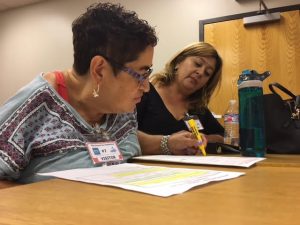April 24, 2019
On election day, what prevents you from casting your ballot? Whether it is getting time off work, arranging transportation to the polling place or ensuring that one’s vote-by-mail ballot is received in time, every voting citizen must negotiate certain obstacles to participate in our democracy. How does a citizen’s ability to participate in elections change if one lives every day with disabilities that impact their lives?

With a grant from the Arizona Developmental Disabilities Planning Council (ADDPC), the Institute for Human Development (IHD) at Northern Arizona University is answering some of those questions. The team will conduct a yearlong, statewide research project identifying barriers to voting for individuals with intellectual and developmental disabilities in Arizona.
Driven by the lack of published research and inspired by preliminary data from ADDPC, IHD will conduct interviews with persons with disabilities, their families and service providers to learn what obstacles prevent election participation.

“Much of the past research in this area has focused only on legal perspectives and very little information is available from the perspective of individuals with disabilities,” project director Arden Day said. “We want to know—are Arizona’s polling sites accessible to people with disabilities? Can they understand the language on the ballot? Do they need assistance from a care provider to vote?”
A planning team consisting of partners from agencies and organizations serving persons with disabilities from across the state will provide valuable input to the researchers.
“We assembled the planning team to ensure that we ask the right questions to understand how voters and potential voters with disabilities experience and engage with the voting process,” project investigator Kelly Roberts said. “We expect that voters with disabilities must
contend with and overcome impediments not experienced by most people.”

IHD is home to a wide range of interdisciplinary programs, efforts that support its mission of facilitating ongoing improvements in access, attitude and inclusion for people with disabilities. IHD, which recently celebrated its 50th anniversary, is one of the nation’s premier centers focused on promoting full inclusion by advancing attitudes that value persons with disabilities and enhancing access to all aspects of the human experience. IHD is a dynamic, multi-faceted environment staffed with faculty and professionals representing a range of human service disciplines and offering a broad spectrum of resources and programs for both NAU students and members of the community.
For more information on the project and to see how you may get involved, contact Arden Day or Kelly Roberts.


